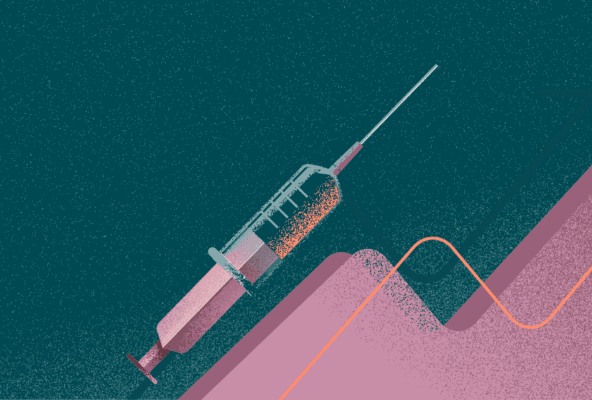Staffing shortages and sleep deprivation: The post-COVID healthcare crisis
Explore the potential consequences of staffing shortages in healthcare, burnout, and other challenges fueling today’s medical industry crisis.

At a Glance
- Healthcare workers are facing critical staffing shortages, excessive workload, and burnout, with 77% fearing an impending healthcare crisis within a year if issues like understaffing and burnout are not addressed.
- Many feel underpaid and unappreciated, leading 1 in 3 to plan leaving their job in the next year.
- Solutions proposed include improving compensation and benefits, hiring more staff to reduce workload, offering more scheduling flexibility, and providing more breaks at work.
While the height of the COVID-19 pandemic is, thankfully, in the past, the healthcare industry still faces plenty of challenges. Many medical professionals feel caught in the crosshairs of an industry crisis that affects healthcare workers and patients alike.
We recently surveyed over 500 medical professionals to uncover the hidden dangers of the most prevalent issues facing the healthcare industry today. Here are our key takeaways:
- California, Texas, and Georgia reported the most critical staffing shortages in the past year
- 35% of healthcare workers have seen a co-worker fall asleep during a shift
- 73% of healthcare workers feel underpaid, and 59% feel unappreciated at work
- 77% of healthcare workers believe a healthcare crisis will occur within the next year due to understaffing and employee burnout
- 1 in 3 healthcare workers plan to leave their job within the next year, and 14% plan to leave the industry entirely
Our research revealed some serious challenges healthcare professionals are experiencing, but also some solutions that may help.
Dangers of healthcare worker burnout
Exhaustion and lack of sleep can lead to mistakes in any field, and healthcare isn’t an exception. Our survey uncovered several alarming insights into just how dangerous sleep deprivation can be for medical professionals.
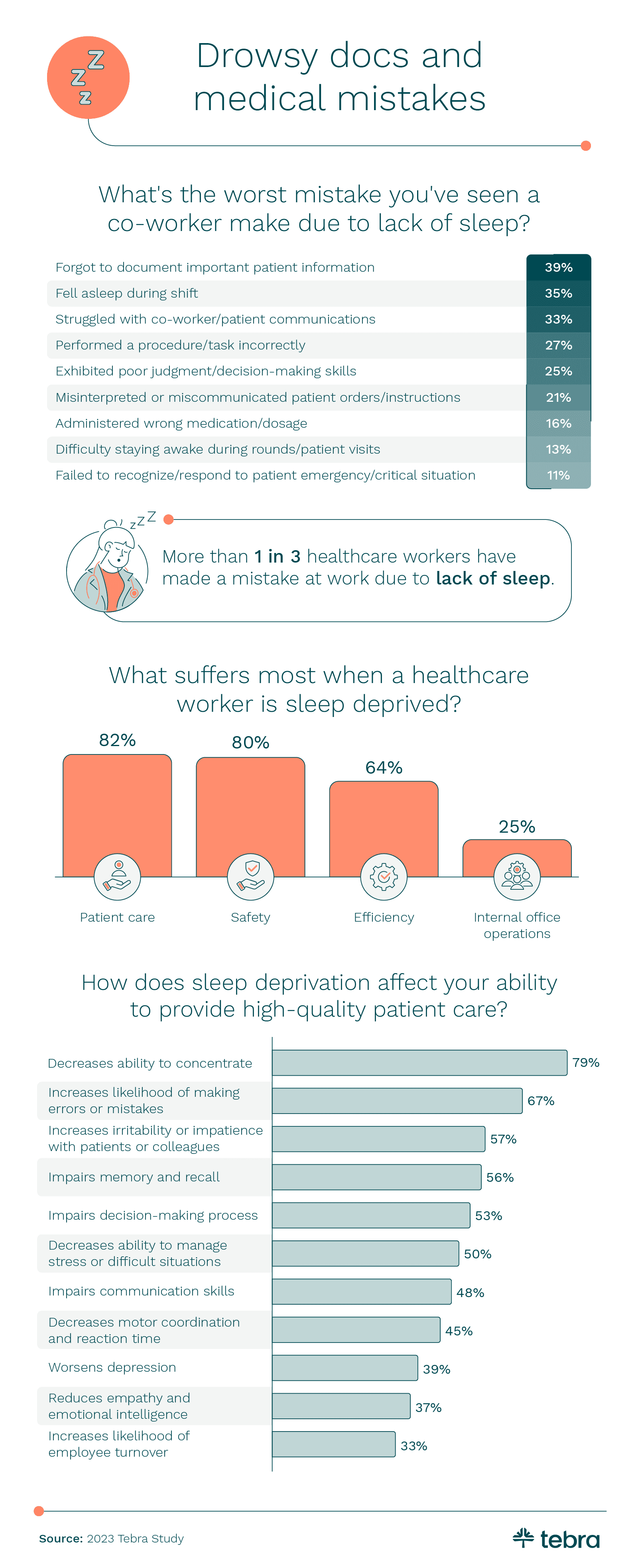
Ironically, choosing to pursue a medical career is a choice that often presents personal health challenges. In a recent Surgeon’s General Advisory report, Dr. Vivek Murthy expressed deep concern about the growing burnout among medical professionals due to difficult and irregular hours spent in challenging and stressful work environments. Many medical professionals are simply exhausted, as 35% of those surveyed have seen a co-worker fall asleep during a shift.
“Many medical professionals are simply exhausted, as 35% of those surveyed have seen a co-worker fall asleep during a shift.”
In a field where forgetting to record an important patient note could be deadly, it’s worrying that nearly 40% of healthcare workers also witnessed an overtired colleague make just such a mistake. But as many respondents noted, burnout symptoms can go far beyond mere physical exhaustion. Almost 80% of survey participants reported difficulty concentrating, and 67% expressed an increased likelihood of making mistakes.
Lack of sleep also affects the ability of healthcare workers to care for their patients’ emotional needs. Close to 60% of participants reported increased impatience or irritability, and 37% said exhaustion affected their sense of empathy and emotional intelligence. Sleep deprivation also inhibited the emotional well-being of healthcare professionals, as nearly 40% expressed a worsening sense of depression.
Medical short-staffing crisis levels
Short-staffing has become one of the most critical aspects facing the medical industry today. Let’s examine the full scope of the problem and its negative effects on many healthcare workers.
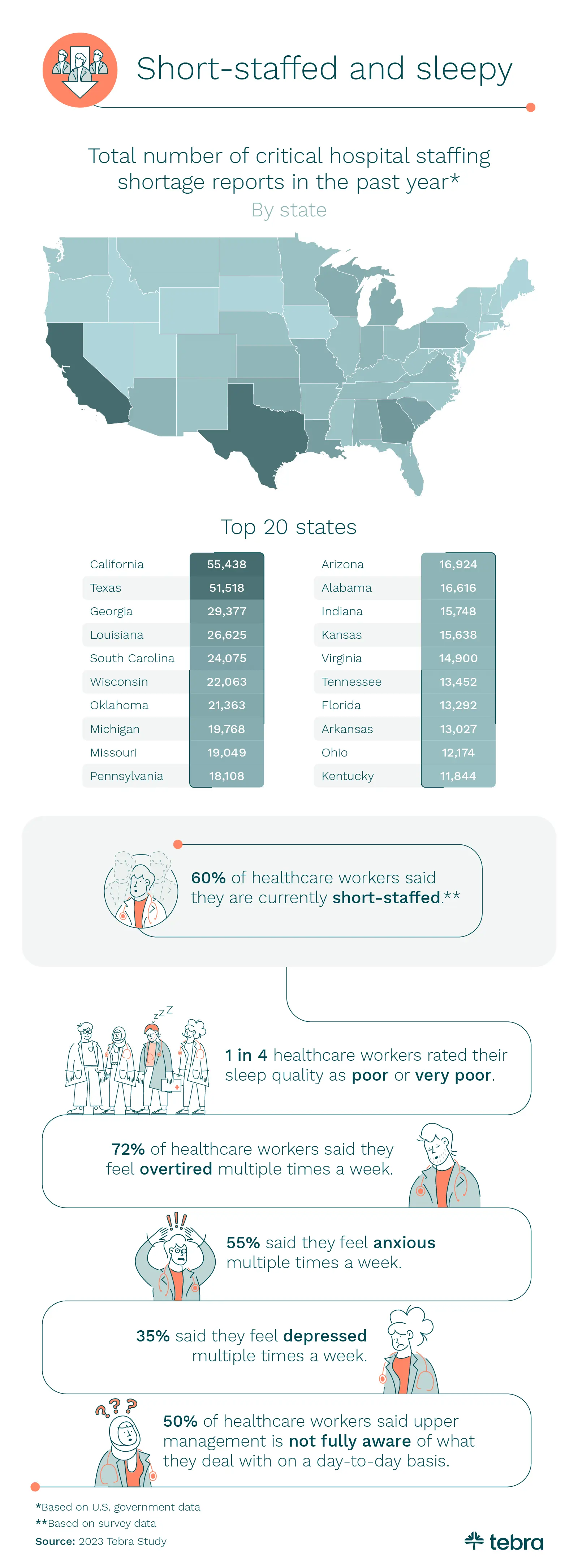
As our survey demonstrated, understaffing affects not only patient care standards but also the mental and physical health of overburdened medical workers. From anxiety and depression to reduced sleep quality, understaffing is taking its toll on healthcare professionals nationwide. California, Texas, and Georgia reported the most critical hospital staffing shortages in the past year, and 60% of healthcare workers overall said their facilities don’t have enough staff.
“As our survey demonstrated, understaffing affects not only patient care standards but also the mental and physical health of overburdened medical workers.”
Shortages like these and concerns about safety and overtime have led to nursing strikes across the country. Over 7,000 nurses recently went on strike in New York City to express their concerns about understaffing’s effects on their ability to provide quality patient care. California also faced its fair share of healthcare upheaval, with multiple nursing strikes across the state this year and last.
Fear of impending healthcare collapse
As the challenges plaguing the healthcare industry continue to mount, many medical workers worry that the worst is still to come. Discover what healthcare workers wish their bosses would do to promote change — and what they fear may happen if they don’t.
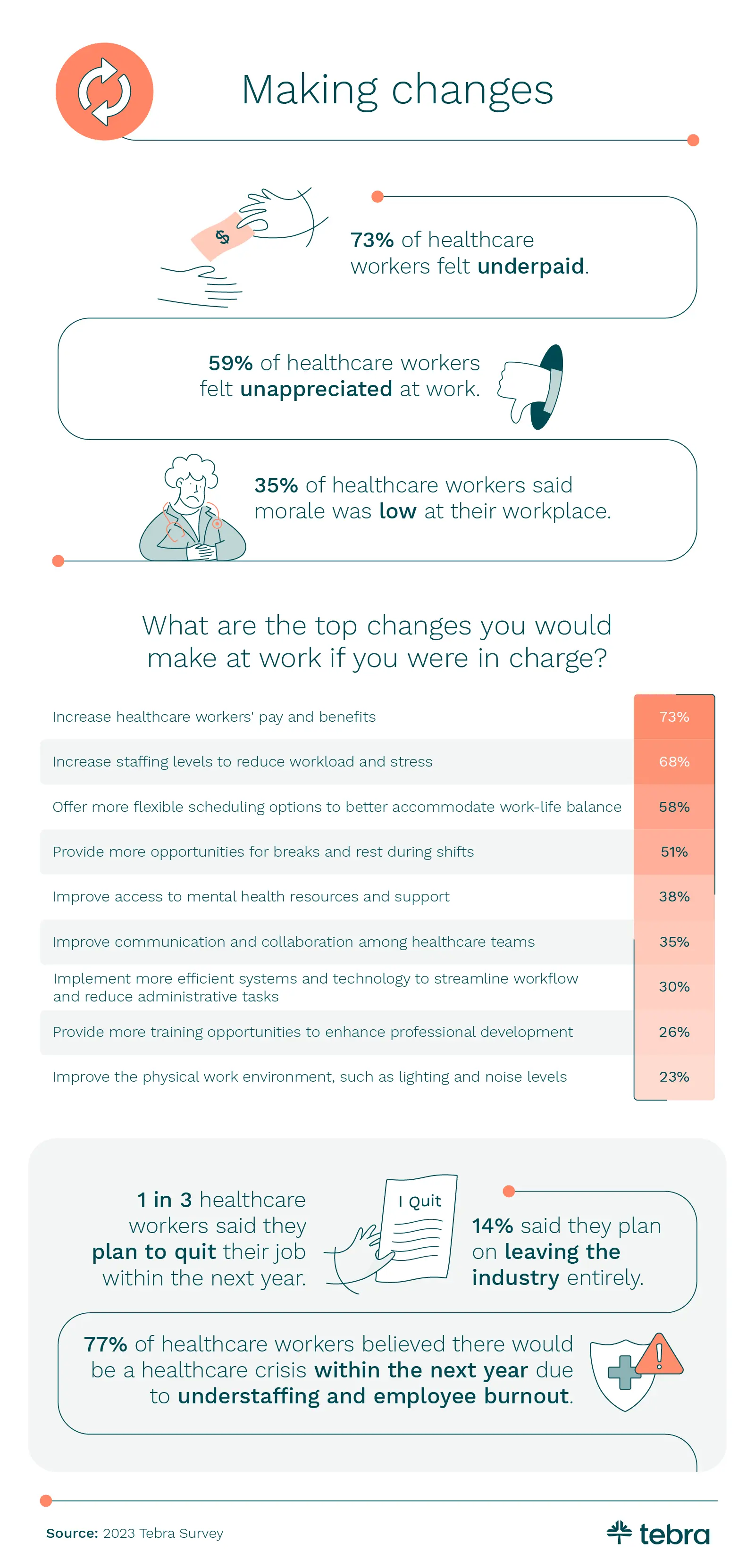
The COVID-19 pandemic drove many older medical professionals into retirement and created a whole new level of workplace demands for those who remained. Healthcare workers clocked longer hours and endured higher stress levels, but many were not rewarded financially for their hard work and commitment.
Instead, COVID-19 relief money went to things like facility upgrades and new technology. In light of these considerations, it’s not surprising that 73% of the healthcare workers we surveyed felt underpaid, and 59% felt unappreciated at work.
Helpful solutions, according to the majority of healthcare workers surveyed, included:
- Improving compensation by increasing pay and benefits
- Hiring more staff to reduce workload and stress
- Offering more flexible scheduling for a better work-life balance
- Providing more opportunities for breaks and rest at work
As increasing pay was the top workplace change suggested by healthcare workers, we thought it would be helpful to see how their annual wages stand across the US. Here’s a look at where compensation might most need improvement.
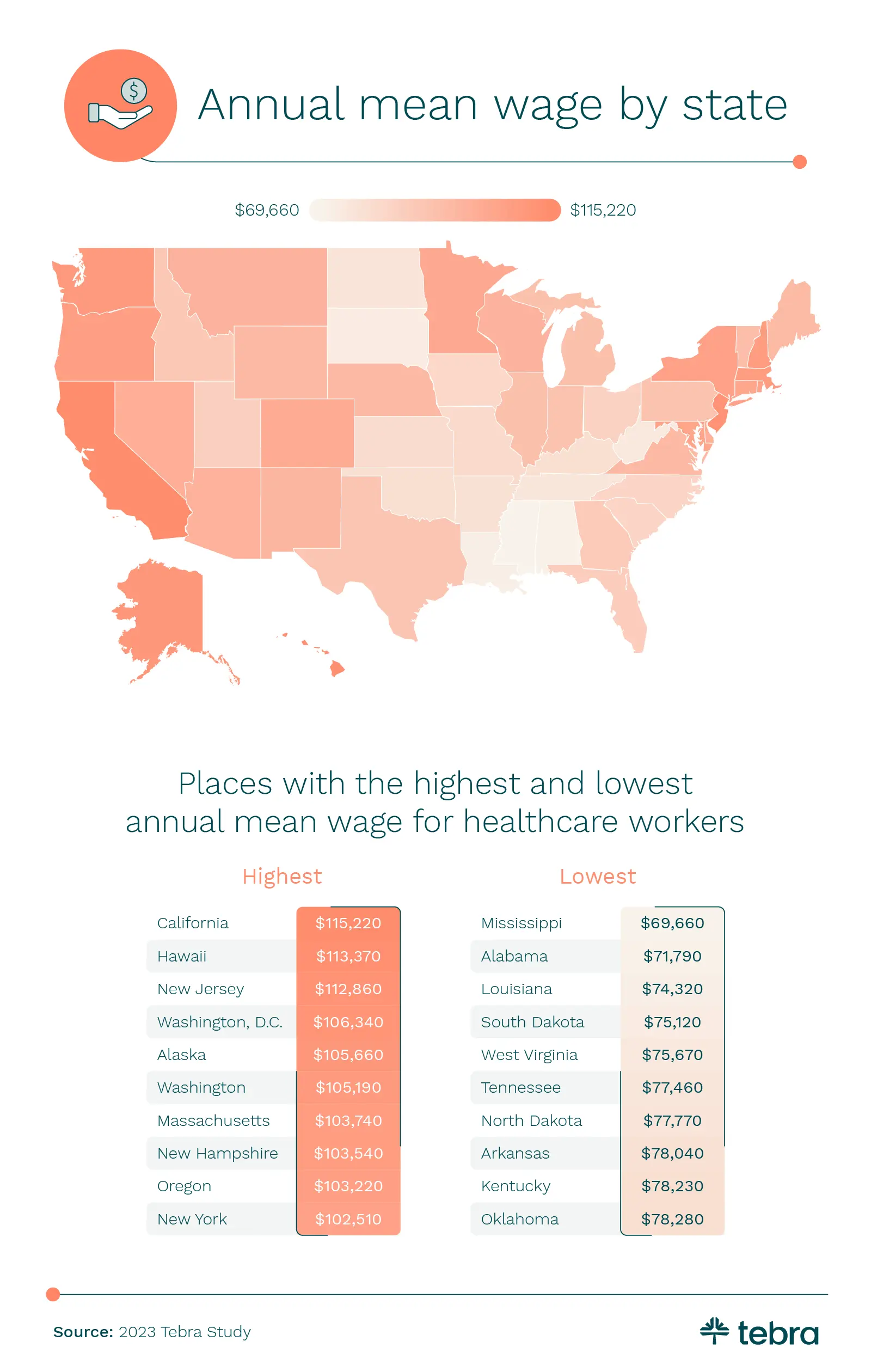
California, Hawaii, and New Jersey healthcare workers had the highest annual mean wages, each over $110,000. The bottom 3 lowest-earning states were all in the South: Mississippi, Alabama, and Louisiana. While the wage divide is noticeable, it’s also important to note that the cost of living varies widely among the states, which could account for some pay disparities. Regardless of location, most healthcare workers reported feeling underpaid.
“Unless workplace changes are made quickly, 77% of healthcare workers fear a healthcare crisis within the next year due to critical issues such as understaffing and employee burnout.”
Unless workplace changes are made quickly, 77% of healthcare workers fear a healthcare crisis within the next year due to critical issues such as understaffing and employee burnout. While healthcare workers bravely did their part to usher the world through the worst of the pandemic, many now feel the time has come to focus on well-deserved self-care. As many as 1 in 3 healthcare workers plan on leaving their job within the next year, while 14% plan to leave the industry entirely.
Time to care for our caretakers
The same medical workers who only recently guided the world through a global healthcare crisis are now facing major challenges of their own. As healthcare workers grapple with burnout and unsafe staffing conditions, now is the time for administrators to take care of those who care for patients.
Timely changes are needed to avoid the threat of a healthcare collapse and to safeguard the health of patients and medical practitioners alike.
Methodology
We surveyed 521 healthcare workers to explore their insights on the effects of sleep deprivation and staffing shortages in the healthcare industry. The average number of critical staffing shortage reports by state were collected from HealthData.gov. Annual mean wage data was collected from the US Bureau of Labor Statistics.
About Tebra
Tebra is a complete operating system offering seamless support for medical practitioners, providers, and patients. From billing and growth solutions to data and patient experience, Tebra combines all the right elements to support medical success.
Fair use statement
Concerned about a potential healthcare crisis? Feel free to share any of the resources or information you find here for non-commercial purposes. We only ask that you provide a backlink to this page so readers can access our full findings and methodology.
You Might Also Be Interested In
Optimize your independent practice for growth. Get actionable strategies to create a superior patient experience, retain patients, and support your staff while growing your medical practice sustainably and profitably.
Stay Ahead with Expert Healthcare & Billing Insights
Get the latest industry updates, financial tips, and expert strategies — delivered straight to your inbox.

Suggested for you
Stay Ahead with Expert Healthcare & Billing Insights
Get the latest industry updates, financial tips, and expert strategies — delivered straight to your inbox.







